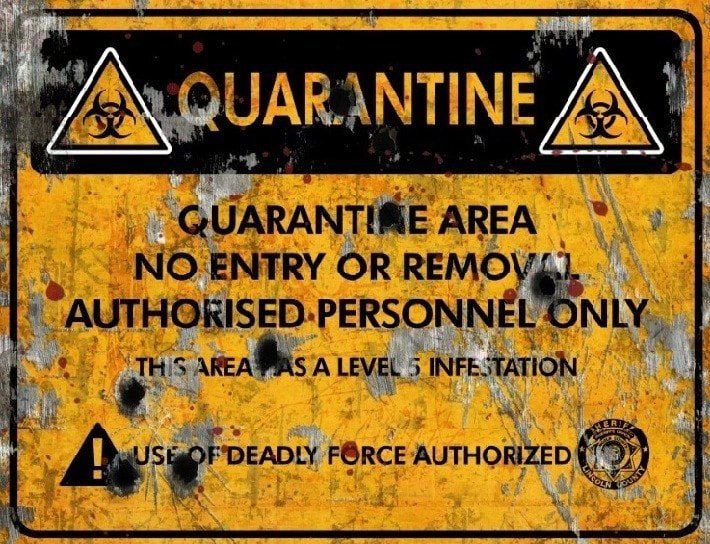What happens if the authorities require my business to close?
Does Business Income insurance respond if a business shuts down because of the coronavirus? What happens if the authorities require the business to close? There is a short answer to these questions, but it's not necessarily a simple answer. The short- and long-term impact of the coronavirus is anyone’s guess. Never before has the United States experienced such a significant interruption of business – and of everyday life. There are more questions than answers, each of which has potential implications, especially when it comes to insurance coverage. Many policies spell out limits and exclusions but few anticipated this atypical interruption of everything from supply chains to vacations. Even as this is written, creative claims and lawsuits are emerging. I receive calls and emails every day regarding the insurance implications of this virus, and the most common question relates to business income, specifically:
No, there is generally not business income coverage in this situation. That's the short answer. The longer and more difficult answer is it may all end up being determined by the courts in lawsuits that are most certainly coming, so the truth of the matter is we may not know the answer right now. If coronavrus (COVID-19) causes or results in damage to your business, coverage will depend on the specific facts of the claim and the specific policy’s language. All coverage decisions require an analysis of the claim’s unique facts against the specific terms of the policy, which can only be determined by your insurance carrier. Therefore, it's difficult to advise whether your business should or should not file a claim (the decision is ultimately yours to make, but it probably can't hurt to try). Before business income responds there must be damage to property leading to the cessation of a business. This requirement applies to business income dependent property losses (supply chain) and civil authority losses covered by business income policies. Additionally, there is a specific property exclusion applicable to viruses that will generally apply. This is true of “standard" business income forms; there may be some proprietary forms that respond, but these are rare. If it hasn't already done so, your organization should develop and implement a comprehensive Business Continuity Plan (BCP). A BCP is a very important part of your overall risk management and emergency procedures plan and should be one that includes the necessary steps to take in the event of an epidemic/pandemic. And, of course, always follow recommended precautions to keep yourself, your employees, and your visitors safe by staying up-to-date on all City, County, State and Federal notices, in addition to recommended travel restrictions and preventive measures. Above, I have provided a download link for a white-paper that gives a broad overview of how insurance generally responds to the Coronavirus peril. I highly recommend downloading and reading it - I will update this document as needed. As always, feel free to reach out to Jon Jepsen at SentryWest Insurance Services if you need help or have additional questions. Disclaimer: This communication is not intended to provide any legal advice or opinion on any individual situation and should not be relied on to determine insurance coverage or lack thereof as relates the Coronavirus. Insurance forms and endorsements vary based on insurance company, changes in edition dates, regulations, court decisions, and state jurisdiction. The information is based on review of insurance coverages, sources we deem to be reliable and communications we have received from insurance companies and other resources. We make no representation or warranty as to the accuracy of information as applied to individual cases. Please advise our office if you want to submit any claim for coverage with your insurance companies.
 We hear this all the time in our insurance office. Tattooists, piercers, permanent cosmetics, and other beauty & bodyworks professionals often think that by having the client sign a release form, they will not be sued. Wrong! The release form can help protect you in court. But, that means you have already been sued and had to hire a lawyer if the shop or individual does not have insurance. Malpractice lawyers now average from $300 an hour and up in almost every location in the country. So the release form may be a help to the sued professional ultimately; but only after hiring an attorney for thousands of dollars and even then it might not carry much weight with the court. Use a release form. But, be aware it will never take the place of insurance. You cannot release liability prior to having a procedure done if there is negligence in the work. That is a well-established case law fact in the US. Release forms should list the known complications. For suggestions on what to include, forms can be requested from Jon Jepsen at SentryWest Insurance Services. Tattooist and permanent cosmetic people must be sure to advise the client of the possible risk of an allergic reaction to pigments. This has become a standard warning. Additionally, all release forms should warn of the possibility of infection and that compliance with aftercare instructions are crucial for the proper healing of the tattoo, permanent cosmetic work or body piercing. While it may not necessarily stand up in court, we suggest professionals have a release of liability. If even one client is put off from suing, it will be worth it. Check your insurance policy. Many policies require a signed release form be on file at the time of the claim, if the claim is to be covered. PPIB’s policy requires a signed release for body pierces and for students or apprentices working on models. Other policies require it for all permanent cosmetic work. Check out what the situation is on your policy so you will be properly covered if or when a claim arises. Courtesy: PPIB Corp.
As most small business owners know, accepting credit cards is a necessity in today’s competitive and fast-paced environment. Technology makes it easier than ever to accept payments from your customers.
You can even use your cell phone or tablet if your business is mobile. While credit cards can be great for ease, they do pose some cons for business owners when it comes to fees—specifically chargebacks. Chargebacks were originally designed to protect customers from fraud. Unfortunately, chargebacks are sometimes used for “friendly fraud”. This type of fraud occurs when a customer receives a product or service, but contacts the credit card company to complain that the item was never received or they never made the charge. The credit card company will investigate the complaint and refund the customer if they find in his or her favor. If the complaint is found in favor of the seller, the business will still be charged a fee for the investigation. A January 2016 study found that 80% to 90% of successful chargebacks were resolved in favor of the customer. Customers sometimes have valid complaints about products and services that do warrant a chargeback situation, but what happens when your business requires appointments to book services and your customer is a no-show? Businesses such as salons, automobile repair shops, and hotels often have to deal with this very issue. Many businesses need to know the number of customers they will serve in a given day for planning and staffing purposes. When a customer doesn’t show up for an appointment, it is the business that has to deal with lost revenue. Many service industries require notice when a customer is not able to make an appointment or reservation. For example, many hotels will charge the equivalent of a one-night stay if the customer doesn’t give a 24-hour cancellation notice. Salons and spas often charge a cancellation fee for the same reason. This practice makes sense for many service-oriented businesses, because without notice you are not able to rebook the time slot or date with another customer. The problem is that many customers call their credit card companies to dispute these cancellation fees. Here are a few ideas to help you avoid getting stuck in this situation and to fight back against unfair chargebacks:
Chargebacks can be a frustrating battle—especially when your business is appointment or reservation based. Hopefully with these tips you will be able to cut down on hassles and find a little more peace when dealing with customer credit card disputes. Sources: http://www.creditcards.com/credit-card-news/8-merchant-tips-avoid-chargebacks-1455.php https://www.nerdwallet.com/blog/credit-cards/credit-card-chargebacks/Entrepreneur Magazine, November 2016. Page 20-21 This post was written by Deidre R., a Product Analyst in the Commercial Lines Marketing Department at Acuity. Deidre’s experience also includes nine years as an Account Manager at an insurance agency. She received her bachelor’s degree from St. Norbert College in De Pere, Wisconsin, and her master of organizational behavior from Silver Lake College in Manitowoc, Wisconsin. Her hobbies include volunteering and event planning for a local women’s shelter, yoga, crafting, reading, and biking. She also enjoys spending time with her husband and dog. It seems that beauty treatments are one of those rare "recession proof" commodities that Americans love. But what happens when that love goes away? Like in 2009, when a 14 year old Florida girl went in to a beauty salon to have her hair dyed blue, and came out with third-degree burns and bald patches. Her parents spent $85,000 in medical expenses and surgical procedures, and turned around and sued the salon for negligence and pain and suffering. It turned out a stylist had not followed the product directions.
While you may have faithful customers and always follow directions, accidents happen all the time. While you focus on your customers and your business, it's important to have the right beauty salon insurance to protect you from financial losses. Hair Salon Insurance Is Important
Salon Insurance for Salon Owners If you are like the majority of salon owners, your small business is your livelihood. Whether you are just getting started or beginning to expand to new locations, you need the right beauty salon business insurance to keep your investment secure. Whether you own a hair salon, nail salon, spa, or provide a variety of esthetician services, you will need these three types of beauty salon insurance:
Common Salon Insurance Issues There are several additional considerations for salon owners, depending upon the nature of the salon and the services offered.
Nail Salon Insurance Because of the sharp tools, chemicals, and extended contact necessary for most manicures and pedicures, it is essential to have the right nail salon insurance to protect your business. Some special considerations for nail salon owners include:
Special Salon Insurance Depending on the types of services you provide, you may need some or all of the following types of insurance for beauty salons:
Jon Jepsen of SentryWest Insurance Services is a Trusted Choice© insurance agenct in Salt Lake City, UT. https://www.trustedchoice.com/small-business-insurance/health-beauty/salon/ The beauty industry is experiencing a major shift right now—with technology and organic products changing the industry.
As a salon owner, you can incorporate these trends into your salon by first being aware of them and then doing your research. Not every trend will fit seamlessly into your business model. But there may be a way for you to incorporate the trend in a small way and then decide if you want to invest in it further. So what exactly are these hot beauty trends?
Keep these trends in mind as you begin to think about the new services and products you may want to offer in your salon. Good communication is necessary in just about every profession, but it’s especially important for stylists. Every day, you are working hands-on with your clients, aiming to give them a look they will absolutely love. And while giving your clients a great look is what the job is about on the surface, in reality, it’s all about building relationships.
While every client is different, here are a few tips to help you win over your clients:
Communication and building relationships isn’t always easy, but seeing your clients happy and coming back makes it worth the effort! Sources
|
Archives
March 2020
Categories |
||||||||
|
3860 S 2300 E
Salt Lake City, UT 84109 Main: 801-272-8468 Fax: 801-277-3511 |
|






 RSS Feed
RSS Feed
